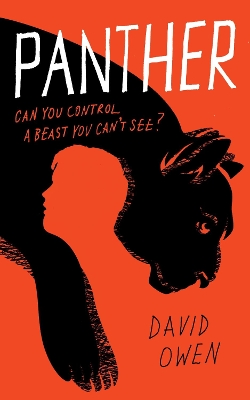Reviewed by Jo on
Panther by David Owen, a book focusing on the experience of living with someone with depression, had me gripped from the very first page. An amazing, realistic portrayal.
Derrick's older sister, Charlotte, has depression, and it's affecting everyone. To Derrick, home is no longer a place of comfort, but a place of walking on eggshells around Charlotte, so as not to upset. Three months ago, Charlotte attempted to commit suicide, and his life has gone from bad to worse. His best friend has ditched him, he stands no chance of ending up with the girl he fancies, Hadley, and he's put on a huge amount of weight - and it's all Charlotte's fault. When there are rumours of a panther roaming his town, Derrick puts two and two together; the panther appeared around the same time as Charlotte's incident, and is sure this can't be a coincidence. If he can catch the panther, everything will be ok - Charlotte will get better, and his life will go back to normal. But how do you go about catching a panther?
This is a really fantastic story of living with someone who has depression. There are quite a few books out with protagonists suffering with depression, but they focus mainly on the central character. However, depression affects more than just the person who is suffering with it, but also those around them, and with Panther, David Owen brilliantly shows just what this can be like.
Derrick is having a really hard time dealing with Charlotte's depression. He blames for everything that's going wrong in his life, and is just so angry with her. And also guilty, that he can't seem to be able to help her. As someone who has been in Derrick's position of living with someone with depression, I found his anger really callous. He doesn't really understand what depression is, but for most of the story. As far as he's concerned, if you're having a crap time, you don't throw huge crying and screaming fits and throw things about the room like a child having a tantrum, you just get on with it like everyone else. He's so angry and so frustrated, and can't stand being in that house. He doesn't seem to try to understand, either. He's too busy blaming Charlotte for everything - not just everything that's changed, but his bad decisions and the consequences of them, too. It's all her fault. Despite my personal reactions to how Derrick handles things, none of this is a criticism of the story. Derrick doesn't get it, and his reaction is pretty realistic of a young guy who's a little selfish, and just wants his life back. Saying all this, he does genuinely care about his sister and wants her to get better, wants to help her, he just doesn't know how. Which is where hunting the panther comes in. He gets it into his head that this is something he can do, something that will fix everything, and he fixates on it.
Derrick has his own issues, too. The book opens with Derrick in an alley, rooting through bin bags for cookies. He's put on a lot of weight because he binges. His need to binge is a physical pain in his stomach, a need he has to fill. He knows it's a bad idea, he hates the way it's changing his body, but it's a compulsion he struggles to fight. With everything that's going wrong around him being out of his control, binging, even though it's bad for him, is a bad thing that he has control over. His binging is happening because he has made a choice, because he puts the food in his mouth. He's punishing himself for not being able to fix anything else, but temporarily feels better for having some kind of control over something. It's really upsetting to read, and I just felt so sorry for him. He also makes some bad choices and does things that are also worrying and disturbing; Derrick is quite clearly not a guy who is coping well. It would have been nice to have seen him get some kind of help, to have someone to talk to maybe. However, if he did, we would have a completely different story, and I think it's important to see why help might be needed in the first place.
The panther. This was a really interesting part of the story. There is a panther roaming in Derrick's town; everyone's talking about it and it's in the news. However, for most of the book, I was never entirely sure whether Derrick ever actually saw the panther, or whether he was imagining things. Derrick's mind definitely played tricks on him whenever these confrontations took place, emphasising further just how bad Derrick is getting, but whether the panther was ever actually there, I'm not sure. It's possible that it might be a complete coincidence, but I like the idea that Charlotte was suffering with depression, which can be known as the black dog, and Derrick is out trying to catch a black cat to make it all right again. For Derrick, the panther did become intrinsically linked with Charlotte's depression, and was almost a physical representation of it - trap the panther, and depression can no longer trap them. I really like this extra layer to the story, even if it's just my interpretation of it.
Though at times a difficult read, Panther is a really incredible, important and powerful story; moving and very real. A brilliant debut I highly recommend.
Thank you to Corsair for the proof.
Reading updates
- Started reading
- 15 May, 2015: Finished reading
- 15 May, 2015: Reviewed
